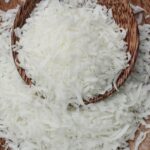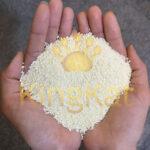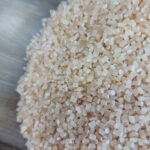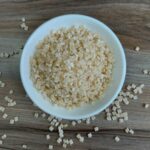CASHEW NUT SHELL OIL

In the fast-evolving world of ice cream production, innovation is the key to success. Manufacturers are constantly searching for new ingredients and processes that can improve the quality, consistency, and cost-effectiveness of their products. One of the most promising ingredients that have gained attention in recent years is modified tapioca starch. Derived from the cassava plant, this versatile starch is processed to enhance its functional properties, making it a valuable addition to ice cream production. In this article, we’ll explore 7 key benefits of using modified tapioca starch in ice cream, particularly in terms of improving stability and overall product quality.
Table of Contents
Toggle1. Enhancing Creaminess and Texture
One of the main challenges in ice cream production is achieving a smooth and creamy texture, which is essential for consumer satisfaction. Modified tapioca starch plays a pivotal role in this area. By interacting with water and fat molecules, it helps create a creamy mouthfeel without the need for excessive fat. This can be particularly advantageous for manufacturers looking to reduce fat content while maintaining a luxurious texture that appeals to consumers.
The starch acts as a thickening agent, giving ice cream the body and texture that traditional fat sources provide. As a result, you get a product that is not only healthier but also retains the indulgent quality consumers expect from premium ice cream brands.
2. Improving Stability and Reducing Ice Crystal Formation
One of the major issues in ice cream production is the formation of ice crystals, which can lead to a gritty texture. Modified tapioca starch addresses this problem by binding with water molecules more effectively than other stabilizers. This binding action prevents large ice crystals from forming during the freezing and thawing processes.
By stabilizing the water content, the starch helps maintain the smooth consistency of ice cream over a longer period, even when exposed to fluctuating temperatures. This improves the product’s shelf life and ensures a consistent texture from the moment it’s made until it reaches the consumer’s spoon.
3. Reducing the Need for Emulsifiers
Traditional ice cream recipes often rely on a combination of emulsifiers and stabilizers to ensure the right balance of ingredients. Modified tapioca starch can replace some of these additives, simplifying the ingredient list and reducing reliance on synthetic emulsifiers. This is especially important as consumers become more conscious of ingredient transparency and seek out products with fewer artificial components.
The starch’s natural thickening properties also enhance the product’s overall stability without compromising on quality. This allows manufacturers to cater to the growing demand for “clean label” ice creams that emphasize natural ingredients.
4. Enhancing Freeze-Thaw Stability
In industrial ice cream production, one of the key challenges is ensuring that the product can withstand multiple freeze-thaw cycles during transportation and storage. Without the right stabilizers, ice cream can suffer from moisture migration, leading to undesirable texture changes over time.
Modified tapioca starch improves freeze-thaw stability by retaining moisture and preventing syneresis (the separation of liquid from the mix). This feature ensures that the ice cream maintains its desired texture and appearance even after extended periods in freezing conditions or repeated thawing cycles, providing manufacturers with a higher-quality, more stable product for consumers.
5. Reducing Syneresis
Syneresis, the process where liquid separates from a gel-like mixture, is a common issue in frozen desserts, especially in lower-fat or non-dairy ice creams. Modified tapioca starch helps control syneresis by binding water within the ice cream matrix, preventing it from separating over time.
This benefit is particularly useful for non-dairy or plant-based ice cream producers, where the challenge of water separation is more pronounced. By using modified tapioca starch, manufacturers can produce products with more consistent textures, improving the consumer experience.
6. Cost-Effective Solution
Incorporating modified tapioca starch into ice cream formulations can be a cost-effective solution for manufacturers. Starch is generally more affordable than other stabilizers and emulsifiers, allowing companies to maintain or even lower production costs without sacrificing product quality.
Additionally, because modified tapioca starch is highly functional even at low usage levels, it can reduce the need for higher concentrations of more expensive ingredients. This is particularly valuable in large-scale production, where cost efficiency is critical to maintaining profitability.
7. Improved Digestibility and Allergen-Free
Unlike some other starches and stabilizers, modified tapioca starch is hypoallergenic and gluten-free, making it suitable for a wider range of consumers. In today’s market, where dietary restrictions are increasingly common, offering ice cream products that cater to specific dietary needs can be a significant competitive advantage.
Additionally, tapioca starch is easily digestible, which is appealing to consumers who may have sensitivities to other starches or ingredients. Its neutral taste ensures that it doesn’t interfere with the flavor profile of the ice cream, allowing manufacturers to maintain the desired taste while improving functionality.

Conclusion
Incorporating modified tapioca starch into ice cream production offers a wide range of benefits, from improving texture and stability to enhancing freeze-thaw performance and reducing the need for artificial additives. For manufacturers looking to innovate in the ice cream market, this natural, cost-effective ingredient provides an excellent solution for improving product quality while meeting the demands of health-conscious and ingredient-savvy consumers.
Whether you’re producing dairy-based, non-dairy, or plant-based ice creams, modified tapioca starch is a versatile and reliable tool that can help elevate your product and ensure long-term success in an increasingly competitive market.












